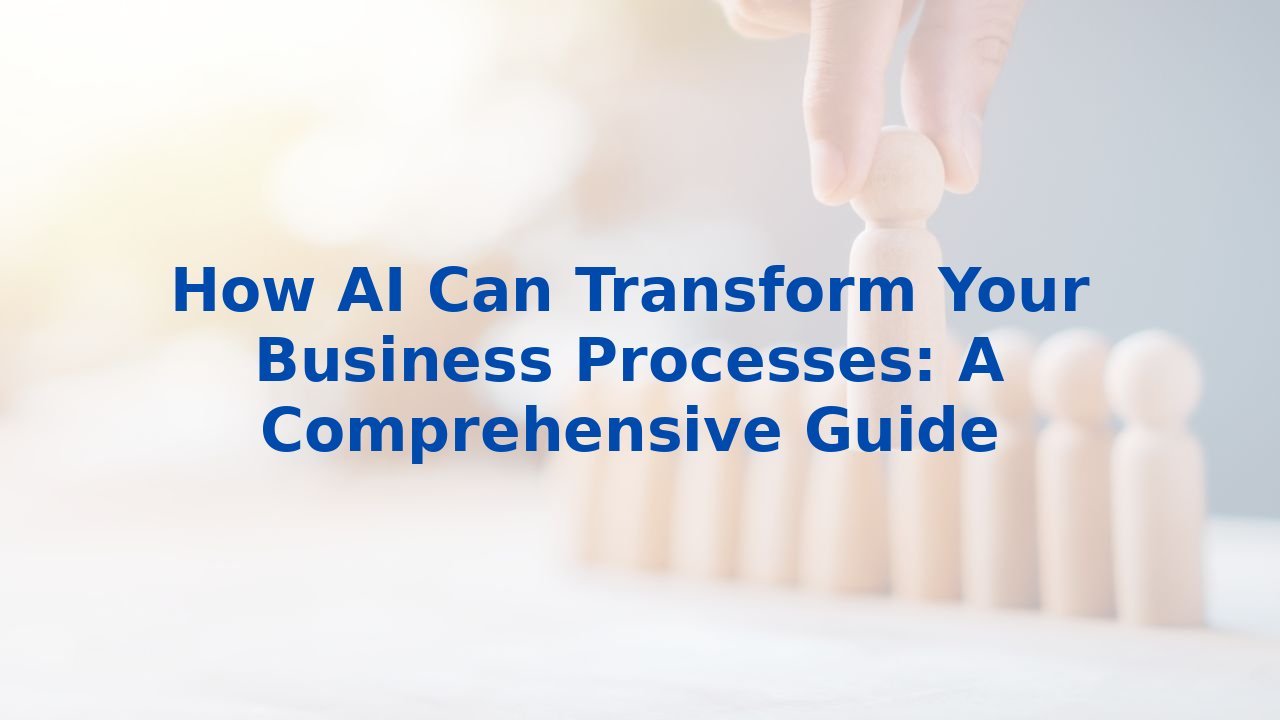How AI Can Transform Your Business Processes: A Comprehensive Guide
How AI Can Transform Your Business Processes: A Comprehensive Guide
As businesses navigate an ever-evolving landscape, the demand for efficiency and streamlined processes is paramount. Artificial Intelligence (AI) has proven to be an extraordinary ally in this pursuit, offering numerous strategies for enhancing business efficiency, productivity, and decision-making. This comprehensive guide will spotlight the transformative power of AI across various business processes.
1. Process Optimization and Automation
One of the most profound impacts of AI is its ability to optimize and automate core business processes. Through the automation of routine tasks, organizations can reduce errors and significantly boost productivity.
- Process Simulation: By analyzing historical data, AI can identify patterns that inform simulation models, enabling businesses to visualize potential outcomes and make data-driven decisions regarding process costs and lead times.
- Process Mining: Leveraging historical data from various sources allows AI to uncover inefficiencies and deviations from established processes, helping organizations identify issues before they escalate.
- Automated Process Discovery: AI's ability to model processes automatically by analyzing data from various platforms provides clarity on workflow visualization, making it easier to pinpoint areas for clarity and improvement.
2. Decision Support and Predictive Analytics
Decision-making is often complex and loaded with variables. AI enhances this aspect by offering robust support through predictive analytics and real-time monitoring.
- Predictive Modeling: By analyzing historical data and trends, AI assists businesses in forecasting future outcomes, enabling proactive measures to be taken to address potential bottlenecks.
- Real-Time Monitoring: Continuous monitoring provides updated insights into process performance, facilitating immediate interventions to capitalize on opportunities or rectify challenges.
3. Customer Service and Sales Enhancement
AI also shines in customer service and sales, providing targeted insights that allow for improved customer interactions and drive increased revenues.
- Sales Insights: AI-driven analytics empower sales teams to uncover invaluable insights within their customer relationship management (CRM) systems, allowing them to focus on high-potential leads.
- Customer Experience Optimization: By analyzing customer feedback, AI identifies gaps in service, enabling businesses to enhance their customer engagement strategies.
4. Product Development and Content Generation
AI takes product development to new heights, infusing creativity into the design and generation of content.
- Generative Design: Designers can input specific goals into AI systems, which then explore potential designs that meet those objectives, effectively saving time and resources.
- Content Generation: AI technologies streamline the creation of engaging and informative content. Various industries benefit from automated product descriptions that enhance digital presence and customer engagement.
5. HR and Recruitment
The impact of AI extends to human resources, where it is reshaping recruitment and onboarding processes.
- Streamlined Recruitment: By automating initial candidate assessments, AI reduces the workload on HR professionals and accelerates the hiring process.
- Personalized Onboarding: Automation not only enhances the efficiency of administrative tasks but also personalizes employee onboarding experiences, boosting overall employee satisfaction.
Benefits of Training Employees for AI
Integrating AI technology into business processes is not solely about automation; it also emphasizes the utmost importance of training employees to work effectively alongside these tools. Here are significant benefits of employee training in AI:
- Enhanced Skills: Training equips employees with the necessary skills to engage effectively with AI technologies, optimizing their workflows and decision-making.
- Adaptability: A workforce trained in AI is more nimble and responsive to technological advancements, ensuring organizations can remain at the forefront of innovation.
- Collaboration: With proper training, employees learn how to collaborate with AI systems effectively, allowing businesses to fully maximize the automation benefits.
Conclusion
The potential for AI to revolutionize business processes is vast. By integrating AI into their operational frameworks, organizations can enhance efficiency, boost productivity, and improve their customer engagement. Key areas such as process optimization, decision support, customer service, product development, and human resources stand to gain immensely from AI technologies. Moreover, investing in employee training ensures that organizations can fully harness these innovations, securing long-term success and positioning themselves as leaders in their industries. For a deeper insight into AI training solutions tailored for businesses, consider exploring options that cater to your organizational needs.



